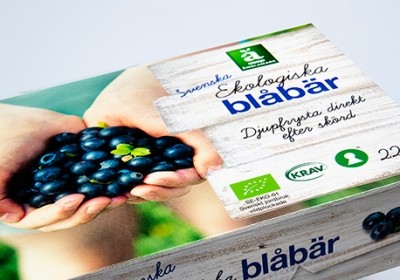New bio paperboard coating caters to demand, says Iggesund
The most common barrier material in paperboard packaging is polyethylene (PE), but this plastic is neither bio based nor biodegradable.
Ola Buhrman, product manager for Iggesund Paperboard’s plastic coated and laminated products told FoodProductionDaily.com that the development of the bioplastic coating, which is starch based, was largely market driven with a clear demand from its customers for a more environmentally friendly material.
“The coating can be, in principle, composted in both home composting and industrial composting conditions, and meets the EN 13 432 standard for biodegradation within a six month period,” she said.
Barrier limitations
However, Buhrman said that the moisture and oxygen barrier properties of the bio coating are reduced compared to that of PE, and thus, the manufacturer recommends testing for every new packaging application.
She explained that the material behaves well in the packaging lines where the Swedish company has tested it, but Buhrman emphasized that machinery adjustments, within normal tolerances, are needed when switching from a PE coated material.
According to Buhrman, the new coating is suitable for use in chilled and frozen food as well as cold drink packaging.
She claims that prices for bioplastics will drop when availability increases and when more and larger production facilities start up; however, Buhrman maintains that Iggesund customers are currently prepared to pay more for a biodegradable material.
Polymer research
Meanwhile, a new process involving the layering of a polymer with silica-based nanoparticles has the potential to enhance the properties of pressure sensitive adhesive labels, water-borne coatings and biodegradable materials, claims a UK research team.
The University of Warwick team, led by Dr Stefan Bon, has created a soap free emulsion polymerization process which makes colloid particles of polymer dispersed in water and in a one step process adds nanometre sized silica-based particles to the mix.
The scientists said that the nanoparticles than coat the polymer colloids with a layer, ‘battering’ it much like coating a fish in bread crumbs.
Bon told FoodProductionDaily.com that the technology results in a versatile polymer latex product that could be fine tuned to produce food packaging that would allow moisture or oxygen to pass through the material in a controlled manner.
“As a result of our research, we now have the tools to make these types of nano-based polymers but they have, as yet, not been produced on a large scale; thus we are only at an early stage of evaluating their commercial applications,” said Bon.
Bon envisages that the newly developed technology might be most applicable to multi-layered biodegradable packaging which could gain more robustness and water barrier characteristics through the addition of a nano-particle coating.
He argues that the process would not be detrimental to the ‘green’ profile of these bio materials as the silica-based particles are derived from sand and clay.







